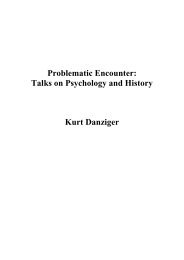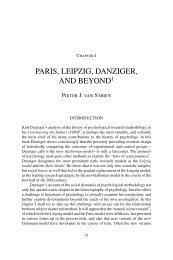The positivist repudiation of Wundt - Kurt Danziger
The positivist repudiation of Wundt - Kurt Danziger
The positivist repudiation of Wundt - Kurt Danziger
You also want an ePaper? Increase the reach of your titles
YUMPU automatically turns print PDFs into web optimized ePapers that Google loves.
THE POSITIVIST REPUDIATION OF WUNDT 211<br />
Avenarius arrived at the same conclusion by emphasizing the limitations <strong>of</strong> our ex-<br />
perience <strong>of</strong> other individuals rather than <strong>of</strong> self. Where Mach exhorts us to “give up the<br />
ego,” Avenarius expatiates on the evils <strong>of</strong> “introjection.” By this term he means the<br />
tendency to attribute mental entities to others. No one finds the mental processes <strong>of</strong><br />
others given in his direct experience, and by going beyond experience and inventing the<br />
mental world <strong>of</strong> others we only land ourselves in the quagmire <strong>of</strong> philosophical dualism<br />
from which Avenarius’s philosophy is designed to extricate us.2o For psychology the con-<br />
sequence is clear. It must investigate the dependence <strong>of</strong> experience on the individual, but<br />
it is the biological and not the psychic individual that is involved. This is exactly where<br />
Kiilpe picked up the thread from Avenarius, with his insistence on the “corporeal in-<br />
dividual” as the source <strong>of</strong> psychological phenomena. For Avenarius, and for KiIlpe who<br />
follows his lead, scientific psychology has no use for mentalistic explanatory constructs.<br />
<strong>The</strong> rejection <strong>of</strong> such constructs is part <strong>of</strong> the <strong>positivist</strong> rejection <strong>of</strong> “metaphysics” and<br />
the restriction <strong>of</strong> science to what can be validated within direct experience.21<br />
Development <strong>of</strong> the Controversy<br />
This line <strong>of</strong> thought was <strong>of</strong> course totally unacceptable to <strong>Wundt</strong>, and it stimulated<br />
him to launch a series <strong>of</strong> critical articles in the Philosophische Studien. In the first <strong>of</strong><br />
these he restricted himself largely to a defense and clarification <strong>of</strong> his own views on the<br />
nature and importance <strong>of</strong> “psychic causality.” 22 <strong>The</strong> second paper contains a direct at-<br />
tack on KUlpe, and finally he devoted over 300 pages to a detailed criticism <strong>of</strong><br />
Avenarius’s (and some aspects <strong>of</strong> Mach’s) As far as matters <strong>of</strong> psychological<br />
interest are concerned, the theme that runs through all <strong>of</strong> <strong>Wundt</strong>’s arguments is his con-<br />
viction that the approach he attacks amounts to the subordination <strong>of</strong> psychology to<br />
biology: “Psychology has an independent task only if that which we call ‘psychic facts,’<br />
‘mental processes,’ and so forth, presents internal relationships which force us, at least in<br />
broad perspective, to conceive contents <strong>of</strong> psychic experience in terms <strong>of</strong> the contents <strong>of</strong><br />
other psychic experience and thus to establish particular forms <strong>of</strong> psychic causality.” 24<br />
<strong>Wundt</strong> saw the essential task for psychology in the establishment <strong>of</strong> principles which<br />
could be applied by the other Geisteswissenschaften, by linguistics, history, ethnology,<br />
and so on. But it could not do this unless it refused to become what Kiilpe and others<br />
were turning it into, a kind <strong>of</strong> “applied physiology.” “First and foremost [psychology]<br />
must therefore interpret the psychic in psychic, and not in physical terms.” 25<br />
In <strong>Wundt</strong>’s view, Ktilpe’s approach to psychology was based on an erroneous<br />
overestimation <strong>of</strong> the scope <strong>of</strong> natural science, on the claim that the latter has a<br />
monopoly <strong>of</strong> knowledge iiberhaupt, not only the knowledge <strong>of</strong> objects, but also the<br />
knowledge <strong>of</strong> subjects. For <strong>Wundt</strong> this position constituted a threat to the future <strong>of</strong> the<br />
new discipline <strong>of</strong> psychology: “If knowledge <strong>of</strong> all <strong>of</strong> reality devolves upon natural<br />
science. . . then psychology finds its work done before it has started with it.” 26<br />
However, there was no chance, in <strong>Wundt</strong>’s opinion, that this attempt to physicalize psy-<br />
chology could succeed. Historically, natural science attained its status by abstracting<br />
from the subject, by avoiding subjective categories; it is absurd to expect it now to ex-<br />
plain the very subject on the exclusion <strong>of</strong> which its status as science depends. It is true<br />
that certain very simple psychological phenomena can be accounted for physiologically,<br />
but<br />
it is an obvious logical error to use precisely those relations in which the specific<br />
character <strong>of</strong> the psychic is not prominent as a basis for conclusions about the general<br />
characteristics <strong>of</strong> the psychic. In this kind <strong>of</strong> reasoning the fundamental error <strong>of</strong> this<br />
position is revealed: to burden natural science with the explanation <strong>of</strong> those con-<br />
stituents <strong>of</strong> experience from which natural science has abstracted in principle.27





